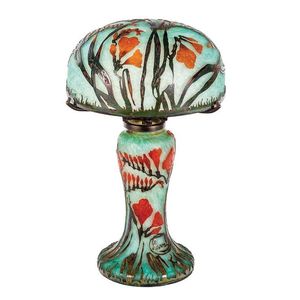Watcombe Torquay Jardiniere with Storks in Lily Pond
You must be a subscriber, and be logged in to view price and dealer details.
Subscribe Now to view actual auction price for this item
When you subscribe, you have the option of setting the currency in which to display prices to $Au, $US, $NZ or Stg.
- Earthenware - A basic ceramic material that is fired at a low temperature. Earthenware is the basis of almost all ancient, medieval, Middle Eastern and European painted ceramics. After firing, the colour is the colour of the clay when it is dug from the ground: buff, brown and red. It is not waterproof until glazed. Creamware is a type of earthenware covered with a transparent lead glaze. Majolica, faience and delft are also earthenware covered in an opaque white tin glaze.
- Acanthus - A stylized leaf motif, one of the primary decorative elements of classical Greek and Roman architecture, derived from the genus of flowering plants in the family Acanthaceae, native to tropical and subtropical regions of the Mediterranean area. It is a common element in classical Greek and Roman design, and is often seen in Corinthian and Composite order columns and used as a decorative element in English, European and Australian furniture, particularly on the curve of a leg, and as decoration for a corbel.
- Firing Crack - A firing crack is a crack in a porcelain or stoneware item that occurs whilst the item is in the kiln.They are usually caused by faulty design, where one part is thicker than the surrounding area, and being thicker it cools more slowly, setting up a stress with the surrounding area. Firing cracks are not often seen on modern mass produced porcelain, as the damaged items are discarded during prooduction. However they are seen in earlier items and artisan-produced objects.
This item has been included into following indexes:
Visually similar items

A fine cameo glass lamp, signed Laval, French, circa 1920. 48 cm high, 27 cm diameter

A carved Chinese stone seal chop, of tall square section, etched with trees and rocks, a goat and insects to the sides. Height 10.5 cm

A Chinese carved ivory Guanyin figure, early 20th century, with rosewood finish base. Height 34 cm

A good quality Chinese cloisonne ring-handled baluster vase with intricate detailed decoration of swallows, flowers, etc., in various colours on an olive ground with cloud motifs. Height on matching wood stand 29 cm
